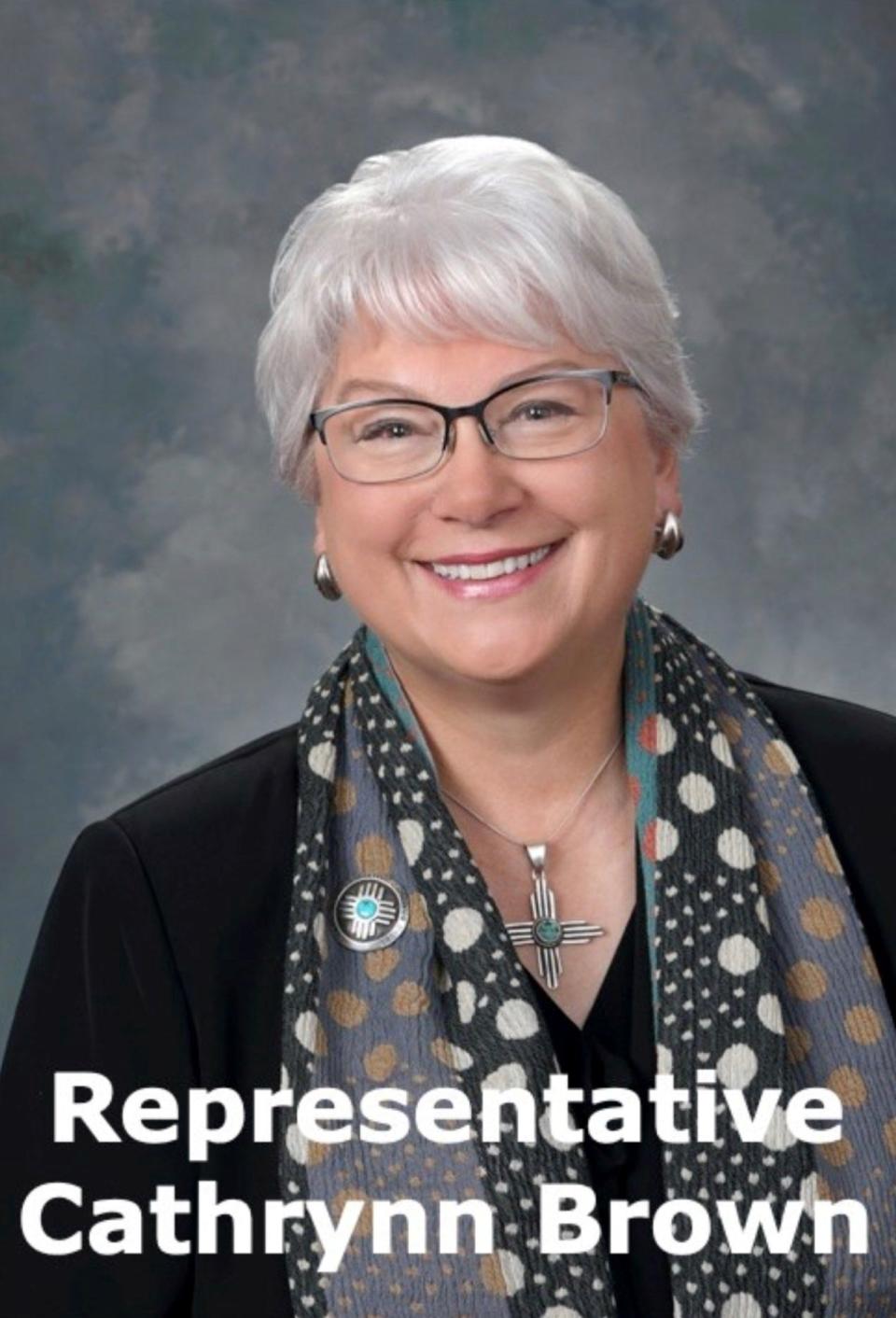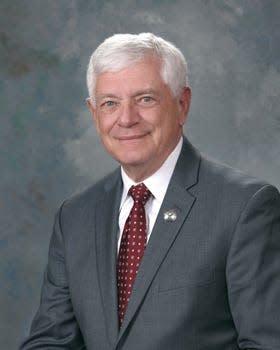Southeast New Mexico lawmakers claim victory, frustration after 2024 legislative session
- Oops!Something went wrong.Please try again later.
Southeast New Mexico Republicans said they defended the oil and gas industry, gun rights and business owners from Democrat-led initiatives during the 2024 Legislative Session that concluded Feb. 15.
Several bills seeking to increase restrictions on firearms, regulations on industry and drive up costs for consumers were blocked or "watered down," GOP leaders said, while others succeeded to the chagrin of the minority party.
This year's session was focused on the budget, running for 30 days, compared to 60-day session convening on odd-numbered years.
More: New Mexico Democrats criticized for inaction on fentanyl bills
But that didn't stop Democrats who control both the House and Senate and the Governor's Office from pushing bills Republicans viewed as limiting constitutional rights or stymieing the economy via restrictions on New Mexico's nation-leading fossil fuel industry.
Oil and gas bills mostly blocked after early-session momentum
Revenue from the fossil fuel industry accounted for about 54 percent of New Mexico's revenue for the next fiscal year, contended Rep. Cathrynn Brown (R-54) of Carlsbad, displaying the industry's import to the state.
House Bill 133 was intended to reform the Oil and Gas Act by adding requirements like setbacks between oil and gas facilities and residences or bodies of water. It also increased bonding requirements that operators pay to fund clean up of abandoned wells, and would have codified into law gas capture requirements enacted by the state's Energy, Minerals and Natural Resources Department.
More: 'Renewable' geothermal energy boosted by bill passed by New Mexico House
Despite the setbacks being removed, and the bonding requirements tiered to reduce costs for smaller oil companies, the bill stalled on the House Floor without a vote.
Brown said this indicated more lawmakers, including Democrat leadership, were beginning to see the essential role oil and gas plays in New Mexico.
"The more you tax this industry, the less production you get and the less revenue for the state of New Mexico," she said. "I think we started the session with the news that the oil and gas industry provided 54 percent of state revenue. That to me was a reality check to everyone about how important this industry is to the state."
More: 2024 Legislative session wrap up: Here's how energy and environment bills fared

Rep. Jim Townsend (R-54) of Artesia said in a likely first, major oil companies appeared to support the amended bill, while smaller, independent producers remained opposed.
"The smaller producers were not in favor of that," Townsend said. "When you have a major lobbyist up there wanting something, you know it's good for their shareholders. But I think, all in all, everybody did alright."
House Bill 48, which would have raised royalty rates operators pay on the value of oil and gas also stalled − this time in the Senate Finance Committee despite passing the House.
More: Tax credits, rape kits & highways: Find out what bills your Eddy Co. Senators are sponsoring
"Most of the state land is already leased," Brown said. "It was really a window dressing bill. It would not have produced much new revenue."
Sen. Ron Griggs (R-34) touted his sponsored Senate Bill 64, which was added to the tax package passed by the legislature and awaiting approval from Gov. Michelle Lujan Grisham. He said this language allowed some exceptions for small oil and gas operators from paying severance taxes on low-producing or "stripper wells" while also devising a program to help those operators come into compliance with state regulations.
More: $300M needed for New Mexico land conservation; Supporters argue for funding in budget bill

"It's probably the first oil and gas bill in the last 20 or 30 years that was favorable to the industry," Griggs said. "But it's also favorable to New Mexico because it allows them (oil companies) to continue producing oil and gas."
Griggs, Brown and Townsend, like many members of their party, were heavily opposed to House Bill 41, known as the "Clean Transportation Fuels Standard" which passed the House and Senate and was awaiting Lujan Grisham's signature as of Thursday.
HB 41 called on the state to begin a rulemaking targeting reductions in carbon pollution from cars and trucks, an action many viewed as favoring electric vehicles and driving up costs for energy companies.
More: Short term state revenue loss for Hobbs passes committee, bills for Carlsbad stalled
The bill would only serve to increase the price New Mexico drivers pay at the pump, Townsend said. Brown estimated the bill would increase gasoline prices by up to 50 cents per gallon.
"Hopefully the governor comes to her senses and realizes that's a really partisan bill," Townsend said. "That was a Democrat bill, and I think they're going to pay for it."
Democrats push gun reforms that infringe 'constitutional rights,' GOP says
Firearms were also a lead topic during the session in the wake of a Lujan Grisham executive order in September that banned open or concealed carry in Albuquerque and the surrounding area amid mounting gun violence.
More: Gov. Lujan Grisham wants New Mexico to spend big. Should oil and gas foot the bill?
The order was blocked by a federal judge days later, but Democrats signaled they remained set on adding restrictions on gun to address the state's crime problems.
Two bills made it through the legislature this year: one that imposed a seven-day waiting period for gun sales after a background check, and another banning firearm possession at polling places.
Griggs said he expected a strong push for new gun laws from the other side of the aisle, but argued the Democratic Party's approach would not impact criminals but law-abiding gun owners.
"The right to carry is constitutional," he said. "All you do with this legislation is hurt the law-abiding guys. The bad guys will get them (guns). They'll get whatever kinds of guns they can get a hold of."
More: Republicans want to repeal New Mexico's electric vehicle requirement
Townsend also challenged the recently-passed gun legislation as failing to address crime, contending lawmakers should have instead advanced multiple proposed bills this year to increase penalties for trafficking drugs like fentanyl allowing them to be accessed by children.
He questioned if New Mexico had ever had any gun-related incident at polling places.
"Why didn't we do anything about fentanyl?" Townsend said. "There were a lot of things we could have done for crime in Albuquerque. It was unfortunate that we wasted our time on silly stuff."
More: Too far or not far enough? Industry, environmentalist unite to opposed oil and gas reforms
Brown said the forefathers who drafted the U.S. Constitution never envisioned waiting periods when adding the Second Amendment, arguing such limits could affect the ability of women to defend themselves from domestic violence.
"We already have instant federal background checks. If it comes back to proceed, that person should be able to buy that firearm," Brown said. "No person should have to wait seven days to defend themselves."
GOP claims victory in blocking paid family medical leave
The minority party was successful in preventing Senate Bill 3, the Paid Family Medical Leave Act which would have created a state-run program to give workers up to 12 weeks off with no interruption in pay to address medical issues like doctor visits for family members.
More: Roads, school and national debt: Here's what Eddy County representatives hope to make law
SB 3 would have created a fund for the program, requiring employers and employees to pay in.
The GOP argued this would unfairly burden businesses in New Mexico, and it was voted down on the House Floor after hours of debate.
Brown, who voted against SB 3, said it would take more money out New Mexicans' pockets for a program she said not everyone would use.
"It would take money out of employees paychecks," Brown said. "People don’t want to loose more of their paycheck. It’s paying into something most people wouldn’t use."
Griggs said the bill needed to go through the Senate or House judiciary committees to fine tune its language to address multiple "holes" the bill had when introduced to lawmakers. This included language that allowed workers to use the program for people they "had an affinity for," Griggs said, among several examples of language he said was too broad.
"I'm not sure why we would want to subject businesses to that," Griggs said. "There's a lot of open-ended things in that bill I hope they will address in the interim. It's coming back."
Adrian Hedden can be reached at 575-628-5516, achedden@currentargus.com or @AdrianHedden on the social media platform X.
This article originally appeared on Carlsbad Current-Argus: Here's what southeast New Mexico lawmakers are said about the session

